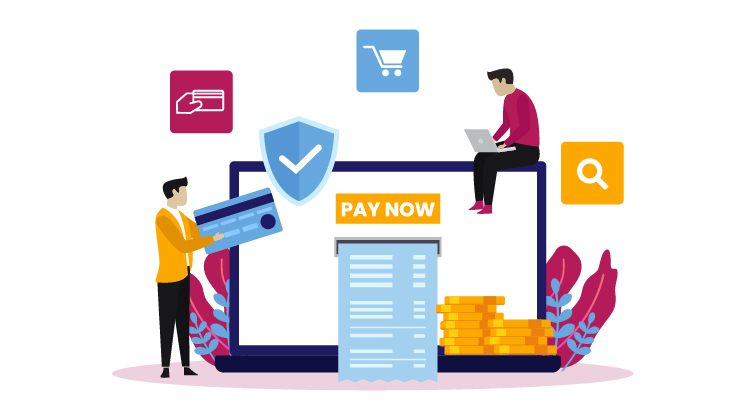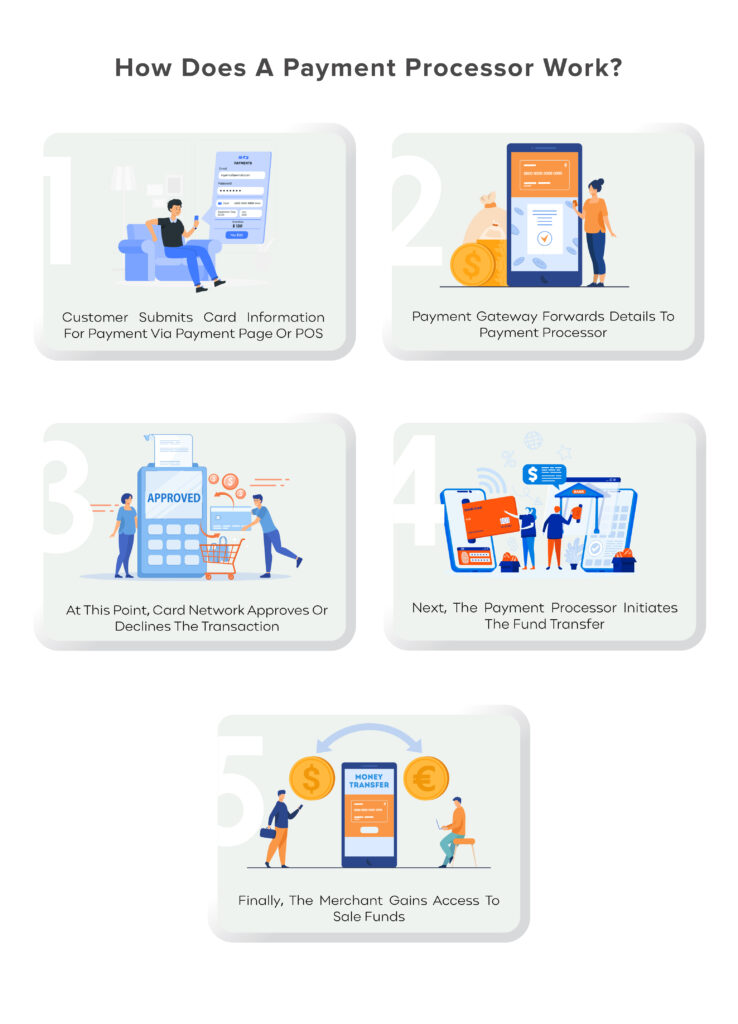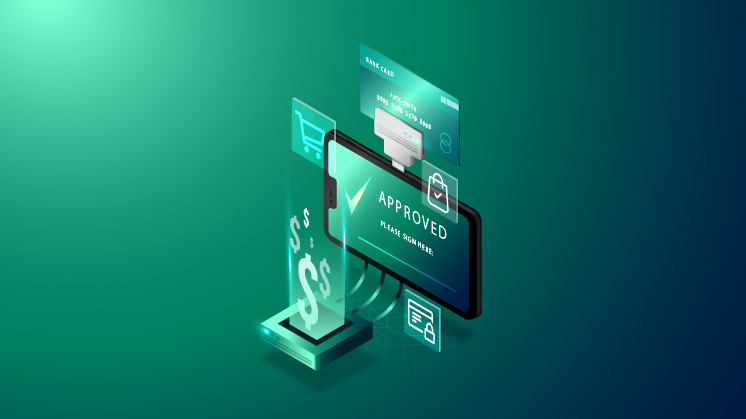As more businesses and consumers rely on online transactions, it becomes increasingly important to have a reliable and secure payment processing system in place. Two essential components of this system are the payment gateway and payment processor.

If you run an eCommerce business, you’ve probably heard about payment gateway and payment processors, and if you are wondering what they are and what’s the difference between them, then keep reading because, in this article, we will compare payment gateway vs. payment processor and will explain how Square simplifies online payments and empowers merchants to accept a wide range of payment options seamlessly.
So, without any further delay, let’s dive right in.
What is a Payment Gateway?

A payment gateway is a service that authorizes and processes credit and debit card payments. It acts as an interface between a website, an app, a merchant, and a payment processor. The payment gateway securely transfers the customer’s payment information between the merchant and the payment processor.
A payment gateway facilitates communication between payment processors and merchants, which is a crucial component of the payment ecosystem.
How Does a Payment Gateway Work?
When a customer places an order on a website or app, the payment gateway encrypts their payment information and sends it to the payment processor. The payment processor then sends the information to the customer’s bank, which approves or declines the transaction. The payment gateway then receives the response from the bank and sends it back to the website or app.

Payment gateways communicate using APIs that send and receive data between the payment gateway and payment processor. When a payment is initiated, the payment gateway captures the payment information, including the cardholder’s name, card number, expiration date, and CVV security code. It then sends this data securely to the payment processor for verification, which involves checking the card’s authenticity and available funds.
Once the payment processor confirms the transaction’s validity, the payment gateway receives the approval or decline status from the issuing bank and sends it back to the website or app.
Pros and Cons of Payment Gateways
Here are a few pros and cons of payment gateways:
Pros of Payment Gateways
- Security: Payment gateways use encryption and tokenization to protect customer payment information, making it almost impossible for hackers to intercept and decode. It ensures the security of sensitive payment data and builds customer confidence.
- Multiple Payment Methods: One of the significant benefits of payment gateways is their ability to offer customers a variety of payment methods, including credit and debit cards, mobile payments, and e-wallets, which leads to a better customer experience.
- Seamless Integration: You can easily integrate any payment gateway with your websites and apps to make the checkout process faster and easier for customers. For merchants, this means fewer abandoned carts and more sales.
- Customer Support: Most payment gateways offer customer support for payment-related issues, so merchants can rest assured they will receive assistance if any issues arise.
- Global Reach: Using a payment gateway enables you to accept payments from customers worldwide, allowing you to reach new markets and gain new customers.
Cons of Payment Gateways
- High Fees: While payment gateways offer security and flexibility, they come with fees that merchants must pay for their services. These fees are typically based on a percentage of the transaction amount, with additional fees for international transactions, chargebacks, and refunds.
- Technical Issues: Technical issues with payment gateways can result in delayed or failed transactions. These issues can frustrate customers and may result in lost sales for the merchant.
- Third-Party Dependence: Payment gateways depend on third-party providers such as payment processors and banks, which can lead to increased risk and complexity. The payment gateway may be affected if these third-party providers experience downtime or technical issues.
- Limited Customization: Some payment gateways offer limited customization options, limiting a merchant’s ability to tailor the payment experience to their brand. It can include limitations on the design of payment pages or checkout forms.
- Chargeback Fraud: Chargeback fraud occurs when a customer disputes an authorized transaction to receive a refund while retaining the item the customer bought. This type of fraud can be challenging for merchants to detect and prevent, and it can lead to financial losses.
What is a Payment Processor?

In online payments, payment processors act as intermediaries, facilitating communication between a business, its customers, their bank accounts, and the business’s bank account.
Regardless of the type of business, every online merchant needs a payment processor to accept customer payments. Additionally, many payment processors provide POS systems for brick-and-mortar stores, making it easier to collect credit card information during in-person transactions.
Merchants can connect payment processors to their accounts to collect payments directly. Alternatively, merchants can use third-party payment processors that store payments for multiple businesses, leading to a more streamlined experience with lower fees.
How Does a Payment Processor Work?
A payment processor facilitates the behind-the-scenes transaction process for businesses. The payment process works as follows:
- Firstly, the customer provides their card information to the merchant via a payment page online or at a terminal in a store. The payment information is then submitted through the payment gateway, a payment processing portal that may come bundled with payment processing services.
- Next, the payment gateway sends the payment information to the payment processor, which initiates the transaction by forwarding the information to the relevant card network, such as Mastercard or Visa, for approval.
- The card network evaluates the payment request and informs the payment processor of its approval or decline.
- The merchant completes the transaction with the customer, and the payment processor then instructs the issuing bank to send funds to the acquiring bank.
- Finally, the merchant receives access to the funds from the sale, which may occur immediately or within a few business days, depending on the payment provider and the type of account.
Pros and Cons of Payment Processors
The following are some pros and cons of using a payment processor:
Pros of Payment Processors
- Cost Savings: Payment processors often charge lower fees than traditional banks for merchant accounts. It can save small businesses money and prevent them from paying monthly contractual fees. It’s important to note that fees vary widely between processors, so comparing costs before signing up is essential.
- Easy Set-up: Banks require extensive set-up processes to set up merchant accounts, while third-party payment processors offer an easy setup process. Small businesses can start selling immediately using an e-commerce processor that integrates seamlessly with their apps and websites.
- International Payment Processing: Processing international payments can be complex due to additional layers of complexity and compliance requirements. Using a payment processor can help navigate this world of tax and banking regulations, making transactions smoother for global customers. With tools like automatic currency exchange, merchants can streamline international transactions.
- Payment Security: Payment processors specialize in keeping up with the latest high-tech security trends. They implement the most current protocols for identity verification, fraud protection, and security checks, which can be time-consuming and costly for small businesses. Payment processors use tools like tokenization and encryption to keep customers’ financial information secure, ensuring PCI compliance for the business.
Cons of Payment Processors
- Limited Control Over Accounts: Advanced security features payment processors offer can sometimes cause merchant issues. For example, if they detect suspicious activity, PayPal may freeze an account, leading to a temporary transaction halt until the investigation concludes. It can be problematic if merchants don’t have a backup processor.
- Transaction Fees: Most payment processing services charge a fee for each transaction, which can add up quickly for businesses with high transaction volume. It’s important to compare fees between different providers to find the best deal.
- Limited Options: Payment processing services offer limited options depending on the provider. Some providers have restrictions on certain devices or brands, making it challenging for merchants to comply with these limitations. Often, this can become a hassle for merchants who want to offer a variety of payment options to their customers.
Payment Gateway vs. Payment Processor: A Quick Comparison
Here’s a quick comparison between payment gateways and payment processors:
| Payment Gateway | Payment Processor |
|---|---|
| Acts as the bridge between the merchant’s website and the payment processor. | Facilitates the transfer of funds from the customer’s account to the merchant’s account. |
| Offers a variety of payment methods, including credit and debit cards, mobile payments, and e-wallets. | It provides security features like encryption and fraud protection, along with multiple payment options. |
| It provides security features like encryption and fraud protection, along with multiple payment options. | Offers real-time analytics and data for merchants to manage their payments. |
| Charge fees are based on a percentage of the transaction amount, with additional charges for international transactions, chargebacks, and refunds. | There might be a fee for each transaction, which can add up quickly for businesses with high transaction volumes and also have lower fees than traditional banks for merchant accounts. |
| It can be integrated with merchant accounts or use third-party payment processors. | It may have restrictions on certain devices or brands. |
How Square Simplifies Online Payments
Square is a leading payment solution provider that offers a simplified way to accept online payments. With Square, you don’t need a separate payment gateway and a merchant account to accept payments, which makes it much easier for merchants to manage their payments in one place.
Here are a few key points of how Square simplifies online payments:
- Integrated payment gateway and merchant account: Square offers an all-in-one solution that eliminates the need for multiple payment service providers to accept online payments.
- Easy setup: Its user-friendly interface and quick setup process make it easy for businesses to accept payments online.
- Integration with multiple platforms: Square integrates with a wide range of platforms, making accepting payments across various channels easy.
- No monthly fees: Unlike other payment solutions, Square doesn’t charge monthly fees, making it more cost-effective for businesses.
- Competitive pricing: Square offers competitive pricing with a flat fee structure, making it easy for businesses to calculate costs.
- Customizable checkout: You can customize Square’s checkout to match your business’ branding, which gives your customers a seamless experience.
- Automatic deposits: Square automatically deposits funds into a business’s bank account, eliminating the need for manual transfers.
- Real-time analytics: Square’s analytics dashboard provides real-time insights into a business’s sales and performance, enabling data-driven decision-making.
- Fraud prevention: With Square, you get fraud protection as it uses cutting-edge fraud prevention measures to protect businesses and customers from fraudulent activity.
- 24/7 customer support: It provides a 24/7 customer support service to assist businesses with issues and questions.
Go Global with WP EasyPay: The Best Square Payments Plugin for Secure, Fast & Easy Online Transactions
Are you tired of dealing with complex payment solutions or struggling to manage multiple payment gateways for your WordPress website? Check out WP EasyPay – the best Square payments plugin for secure, fast, and easy online transactions.
Navigating all the options for a secure and efficient payment process may be challenging. If you’re a global business, finding a payment solution that works across different countries can be tough.
Fortunately, WP EasyPay is the perfect solution to all your payment woes. With this plugin, you can easily integrate the Square payment gateway on your website in just a few simple steps. WP EasyPay supports multiple payment options, including credit cards, for easy and efficient payment processing.
And the best part? WP EasyPay is a global Square payment plugin that lets you accept payments from customers worldwide without complications. Aside from that, with outstanding uptime and real-time reports, you can be confident that your payments are secure and your business is running smoothly.
So, if you’re looking for a secure, fast, and easy way to accept payments on your WordPress website, look no further than WP EasyPay. Install and activate the plugin today and start accepting payments from your global audience with ease!
Wrapping Up
When you compare payment gateway vs. payment processor, you realize each performs different roles. A payment gateway is a technology that securely authorizes credit card transactions between a website and the payment processor. On the other hand, a payment processor is a financial institution that processes the payment.
Most third-party payment processors, such as Square, simplify online payments by eliminating the need for a separate payment gateway or payment processor (merchant account), making it easier for merchants to manage payments in one place.
Moreover, if you own a WordPress website and want to take advantage of Square’s payment capabilities – the WP EasyPay plugin makes it easy! It’s a powerful Square payment plugin for WordPress that offers secure, fast, and easy payment transactions.
Frequently Asked Questions
Square is a financial services and digital payments company that provides various services, including point-of-sale software and hardware, online payments, and business management tools.
Square is a transaction payment processor through its point-of-sale hardware and software and its online payments platform.
Yes, Square is a merchant processor that enables businesses to accept customer payments using various payment methods, including credit cards, debit cards, mobile payments, etc.
Square is both a payment processor and a gateway, providing businesses an easy and convenient option for accepting in-person and online payments.

